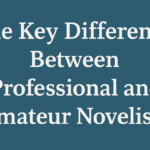
What Exactly Does a Book Editor Do [And Why Do Authors Rely on Them?]
April 6, 2025
The Key Difference Between Professional and Amateur Novelists
April 14, 2025When it comes to signing a book deal with a major publisher, many aspiring writers dream of the opportunity. However, the process can feel overwhelming, especially when you’re unfamiliar with the terms and conditions of book deal contracts. In this case, learning about how to get a book deal goes a long way.
At its core, a book deal involves an agreement between the writer and the publisher, where the publisher agrees to help bring the author’s work to market. The money offered in a deal varies based on the process and the specific Big Five publishers involved. Questions often arise about how these deals work, how the terms are negotiated, and what factors impact the overall deal. In short, understanding the work behind a book deal can provide clarity on how to successfully navigate the publishing industry.
Structure of a Book Deal
A book deal typically involves two main financial components: advance and royalties. The advance is a payment made upfront, often paid in installments during the publishing cycle, such as upon signing, accepting the manuscript, and on publication day. This is essentially an advance against future royalties, which are earned when books sell. Royalties are paid as a percentage of the retail price the customer pays to the book retailer, usually around 10-15% for hardcover books and lower for paperbacks.
Royalties are graduated, meaning they increase as more copies are sold. However, the author doesn’t receive royalty checks until the advance is paid off. Additionally, an agent plays a crucial role in securing the book deal, negotiating the contract on the author’s behalf and receiving a 15% commission on both the advance and any earned royalties.
The agent’s commission comes first, leaving the author with 85% of the remaining earnings from the advance and royalties. It’s important to understand that a book deal is based on a mutual understanding between the publisher, agent, and author, with the goal that the book might become a bestseller, but even if it doesn’t, the publisher can still make a profit.
What Makes a Book Valuable to Publishers?
From my own experience working closely with editors and authors, I’ve seen firsthand how a publisher assigns a price to a book that might seem like a priceless work of art to its creator. When a literary agent sends a submission to an acquisitions editor, it sparks a behind-the-scenes process that’s more meticulous than most writers imagine. The editor, along with the finance team, uses Excel templates loaded with built-in calculations to generate what’s known as a profit and loss statement.
This document helps estimate sales, pulling data from comparative or comp titles, often tracked through databases, to forecast how many copies your book might sell in different formats—like hardback, paperback, or e-book—each carrying a unique margin. They look at how those similar books performed in the market, how much money they earned, and what value the new project might hold.
The estimates are based not only on copy numbers but on how unpredictable the publishing business can be—some books sit on shelves quietly, while others fly under the radar before becoming surprise bestsellers. The final advance offered depends on many moving parts: past figures, current costs, and the risk the house is willing to take.
I once saw a debut novel cause a heated auction, with multiple houses pushing the bid up far beyond the original production expectations. The negotiation phase is where the agent fights for the author’s best outcome, knowing that one strong offer might lead to a better one. I’ve even seen a deal hit six figures because the team believed the author’s story wasn’t just good—it was worth taking a risk for.
This isn’t just guesswork; it’s a structured dance between business smarts and creative passion, where even a question about a book’s worth can spark a chain reaction of decisions rooted in every detail—from the rule of projected profits, to the emotional belief in the author’s potential.
Key Contract Terms in a Book Deal
In my early days of navigating book deals, I quickly realized how distinct these contracts are from any agreement a typical person might encounter, especially when aiming for a major publisher. One crucial clause is the language rights—whether the publisher can release your book in just English or in multiple languages, opening opportunities for broader reach.
Then come subsidiary rights, often referred to as sub rights, covering everything from foreign rights to audio and large print editions. For example, if your novel performs well, your publisher might publish a Mandarin version for the China market, or simply sell your English version in countries like India, Germany, or China without translating it. Another clause I’ve found fun especially for first-time authors is the number of free copies you receive.
Though it varies by contract, those author copies are gold when you want to gift your book to family and friends who supported your writing journey. Then there’s the option clause, which often gives your publisher a first look at your next book. This doesn’t demand a finished manuscript; most contracts require a few sample chapters and a plot outline. From there, the publisher decides if they want to move forward. And don’t worry—authors regularly shift between publishing houses. If one deal doesn’t pan out with your current house, another door may open. Trust me, with perseverance and the right terms, your publishing career can still flourish.
How to Get a Book Deal: 5 Steps to Follow
1. Write a Strong, Market-Ready Manuscript
Before anything else, you need a polished, compelling manuscript. For fiction, this means a fully finished and edited novel. For nonfiction, you’ll typically need a detailed book proposal and at least one sample chapter.
Make sure your work fits within a recognizable genre, has a clear audience, and demonstrates your unique voice or perspective. Editors want to see not only quality writing but also market potential.
2. Build Your Author Platform
Publishers are more likely to take a chance on an author with a visible presence. This means having a website, an active newsletter, and ideally, an engaged audience on social media. For nonfiction authors especially, platform is a huge part of the equation.
Don’t wait until you’re querying—start building your platform early. Focus on offering value, connecting with your ideal readers, and showing that you understand your niche.
3. Research and Query Literary Agents
Most traditional publishers don’t accept unsolicited submissions—you need a literary agent to represent your work. Spend time researching agents who specialize in your genre. Read their submission guidelines carefully and tailor your query letter for each one.
A great query letter should hook the agent with a strong pitch, include a short author bio, and show that you’ve done your homework.
4. Prepare a Professional Book Proposal (for Nonfiction)
If you’re writing nonfiction, the proposal is your sales tool. It should include:
- An overview of your book’s purpose and market
- A competitive analysis
- A detailed chapter outline
- Sample chapters
- Your author bio and platform metrics
Think of it as a business plan for your book—because that’s exactly how agents and editors will view it.
5. Be Patient, Persistent, and Professional
Rejection is part of the process. Keep querying, improving your pitch, and refining your manuscript. Don’t burn bridges or respond emotionally to rejections—publishing is a small world, and professionalism matters.
If an agent shows interest, be ready to discuss your goals and vision. If you get multiple offers, consider the long-term fit—not just the fastest deal.
Final Thoughts
Getting a book deal takes time, effort, and a strategic approach. But with persistence and the right preparation, you can put yourself in the best possible position to succeed. Focus on writing well, building your presence, and pitching smart—and your publishing dream can become a reality.
If navigating the world of book deals feels overwhelming, you’re not alone. From understanding complex contract terms to finding the right agent or publisher, the journey can be both exciting and intimidating. That’s where Penman International comes in.
At Penman, we help authors at every stage—from refining manuscripts and building platforms to connecting with industry professionals and exploring publishing options that align with your goals. Whether you’re aiming for a traditional deal or exploring hybrid models, our expert team is here to guide you through the process with clarity, strategy, and unwavering support.
You’ve put in the work to write your book. Let us help you take it to the finish line—and beyond.
Ready to make your publishing dream a reality? Get a free quote or contact us today.



